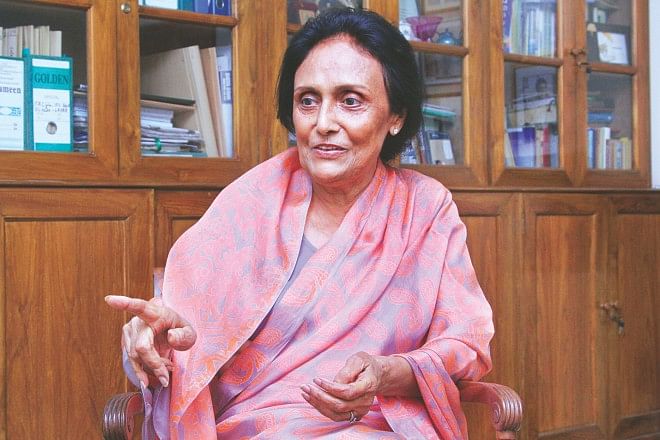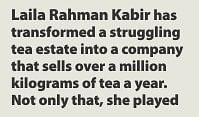The icon in our midst

Sometimes adversity is what you need to face in order to become successful. Thrown in at the deep-end, Laila Rahman Kabir has prevailed since.
Her entry into the corporate world came in the midst of the country's war for independence. The company she took over was not in the best of financial and physical health, and was facing a buyer's market. By dint of sheer determination and hard work, she not only turned the company around, but has gone on to establish it as one of the preeminent ones in its field.

It was in the 1960s that her family bought Kedarpur Tea Company Ltd, which came with three “derelict” gardens. Having studied agricultural botany at Durham University in the UK, the onus to bring the gardens back to life fell on her. And due to lack of professionals in the early days, she had to do all the work on her own.
“It was tough, but it needed to be done. I had to do the job,” recalls Laila Kabir.
Just as the gardens were getting their verve back, her husband Ahmadul Kabir, an organiser of Bangladesh's war of independence, was detained by the Pakistan army in 1971. She had no other option but to step in: the gardens were the only source of income for the family.
“Working on the derelict gardens is something that came naturally to me, as plants were always a major part of my life. But running a company, it was alien to me.”
She soon discovered that the company's facilities were massively outdated and in urgent need for an overhaul. But the problem was that she did not have the funds needed; she only managed an insignificant amount of loan from state-run Krishi Bank, as she produced “only a small quantity of the crop”.
To make matters worse, the tea sector was in a dire state, as there were not enough buyers for tea. Previously, almost all the tea that was produced went to West Pakistan, meaning that avenue had now closed for the company. “Even if there were some buyers, they did not give a good price as they knew that Bangladeshi growers would not be able to find buyers elsewhere.”
Then there was the little matter that there was not enough local demand either, as Bangladeshis were not used to drinking tea then.
But, Laila Kabir rose against all these odds. Today, the company sells over a million kilograms of tea a year, with the three gardens of Kedarpur Tea Company now producing the best tea in the country.
“I never felt that I would not succeed.”
And, her efforts were not only for her company; she played a pivotal role in shaping the tea industry into what it is today. Her determination to make tea a leading export item culminated in the formulation of the tea policy.
She is an active member of the Association of Tea Planters of Bangladesh, and in 1992 she was elected the chairman, the first and only woman to have held the honour to date. Her success in the role has led her to head the association for a second term.
As a representative to the wage board, she proposed that the wages of the sector's male and female workers be made the same.
In 1994, Laila Kabir was elected the president of the Bangladesh Employers' Association, now Bangladesh Employers Federation, a national body of employers. She was also the president of Metropolitan Chamber of Commerce and Industry, the country's most prestigious lobby group. Once again, she was the first woman to be elevated to the two high positions.
“Succeeding in a man's world was a real challenge, but I never felt that it was difficult to work there. If you are a true entrepreneur and good enough, you will shine, no matter what.”
A firm believer in women's empowerment, Laila Kabir is actively engaged with the country's National Skills Development Council as its executive committee member. She said women could become successful entrepreneurs if they had access to skill development and finance.
A political activist in years leading up to independence, she is pleased with the progress the country born in front of her eyes has made.
“Bangladesh has developed despite all the hiccups. It is not only in garments, so many things are happening. We can grow faster if we can run the country in a better way,” said Laila Kabir, also a member of the board of the Centre for Policy Dialogue.

 For all latest news, follow The Daily Star's Google News channel.
For all latest news, follow The Daily Star's Google News channel. 



Comments